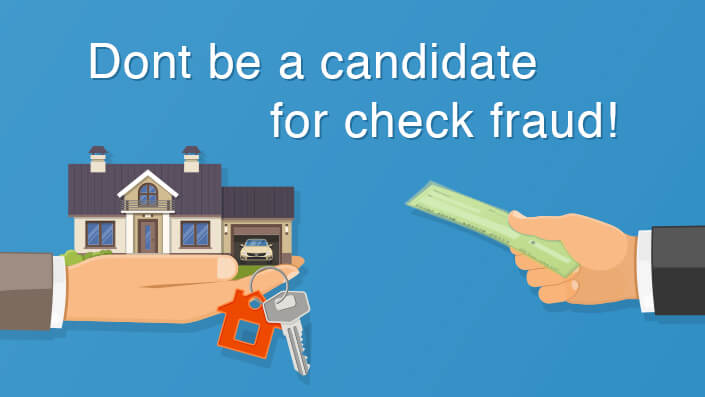
I have identified that there are four Fraud threats that can affect a real estate transaction – Wire, Check, Identity and Email Fraud. Our articles on these different types of fraud are on our website for your perusal.
Check fraud may not get the same news coverage, may not be as horrifying as wire fraud because the amounts defrauded may not be as large, but it is still fraud. If you have something of value, there will be people out there who are thinking of ways to part you from it.
I have written another article on check fraud which can be found at this link. That article is a cautionary tale for the general unsuspecting public. This one is for parties who are more savvy as I am going to talk about how check fraud affects the real estate transaction.
First of all, let’s go back and look at the role of the Settlement Agent in a real estate transaction. If you have read my other Fraud articles, the following paragraphs will look very familiar.
What is the main purpose of the Settlement Agent? We are the impartial, neutral third party whose responsibility is to hold funds and documents handed us in trust in a real estate transaction until mutually agreed upon conditions have been met, at which time instructions for the disbursement and handling of the funds and the documents are carried out.
The importance of “hold funds and documents” cannot be overemphasized. Parties put their trust in the settlement agent and this trust must not be broken. Unfortunately, sometimes the trust doesn’t go both ways.
With the yearly exponential advancement of technology and the use of this new technology in our everyday lives, there are a number of unintended consequences that would never have been an issue a few years ago. To keep the trust that we should have with each other, the settlement agent is hard-pressed to keep up with the advances in technology.
OPENING FUNDS (GOOD FAITH DEPOSIT)
A good faith deposit is given to the Settlement Agent to open the transaction. The funds could be a personal check, a cashier’s check or wire funds. 40% of the time it is a form of a personal check. Since this is given at the start of a transaction, there are no issues to our accepting it as there would be a good amount of time before the closing. There is usually sufficient time to clear the check.
There are two possible scenarios that could give us concern at this time. First, if the Buyer cancels the transaction shortly after the opening and then demand their funds back, or secondly if there is a release of the deposit to the Seller early in the transaction. In both scenarios, it will require that the parties are made aware that the funds have to be fully collected and the check cleared before they can be re-issued out.
A transaction cancels and the Settlement Agent sends a check back to the Buyer to return the good faith deposit. After the check is sent out the Buyer’s original check is returned as a “Non-Sufficient Funds” item. The Buyer refuses to give the money back and the Settlement Agent is out the money.
Fraud?
Yes, it is.
The Settlement Agent is short and has to make up the shortage.
To prevent such devious practices Settlement Agents are always cautioned to make sure the checks have fully cleared the bank before it is released out.
CLOSING FUNDS
It used to be (about 30 years ago!) that we could take personal checks to close escrow. Then about 20 years ago it had to be cashiers checks because the waiting time to clear was relatively short – one business day if it was issued from a California Bank. Then about a decade ago wire funds became popular as those funds could be used to close escrow immediately. Today, with all the problems with wire fraud, some Settlement Agents and clients are reverting back to using cashier’s checks to close escrow.
My company will accept any type of funds for the closing. The constricting factor would be how much time in advance we will need the funds which is dependent on the type of funds that we will receive. We will need at least 2 weeks to process a personal check and 5 business days to process a cashier’s check. Wire funds are good the day we receive them.
I regret to say that if a Fraudster is looking to perpetrate fraud all they need is a very good printer and a very good app to design a very official looking cashiers check.
Here is something to chew on …
A 15 day all cash transaction for $350,000. Buyer waits until last possible minute to deposit the funds. The Buyer alerts the Settlement Agent that his investor partner will deposit $100,000 more than needed as an advance on rehab funds. The transaction closes two days after the funds are deposited. All funds in the transaction are disbursed one day after the closing date. The Seller gets his proceeds, the Buyer gets his a check back for his rehab funds and the costs are paid. Three days later the Settlement Agent gets a notification that the cashiers check given was a fake one. The Settlement Agent has now been defrauded $450,000 and this Buyer can no longer be found. The Settlement Agent must put back the funds from their own pocket and start the process of rewinding the transaction through the Courts.
Scary, isn’t it?
POST CLOSING FUNDS
The Settlement Agent gives the clients a check and they deposit it into their account. Today, you can take a picture of that check and deposit it straight into your checking account through your phone. Who needs to go to the bank? This is how technology takes a slap at us and we scramble to change our management procedures.
A refund check was given to a Buyer after closing. The Buyer took a picture and deposited it into his bank. Months later the Buyer finds the check lying around and deposits with his bank. Again. The accounting department of the escrow company did not realize this check had already been cashed and paid it again. The auditors caught it during their yearly audit. The amount was not much but the Escrow Company requested that this Buyer return the amount that they double deposited, which he did. Happy ending!
And a not so happy one …
A Seller received a check for over $250,000 in net proceeds from a sale. He deposited the check with his phone into his bank. An hour later he comes back and told the escrow officer that he changed his mind and preferred to have two wires instead. He returned the check, the Escrow officer voided it and proceeded to issue 2 wires to his account. The Seller left the country and the Settlement Agent is short $250,000.
Do we void and reissue checks immediately? No. Once a check leaves our office, even if it was just for a few minutes and then brought back to us immediately, we must put a stop payment on it and wait 24 hours. This new management procedure is a direct result of the story outlined above.
Management policies to combat fraud are being updated on a daily basis. The escrow industry is a small one and stories of fraud transmit through the industry like wildfire.
Don’t be a candidate for Check Fraud. Here are some tips:
- Trust no one
- Question everything
- Do not be rushed into anything. The Fraudster will want to rush you to deposit and rush for the refund
- Trust your gut instinct
- Try to call the paying Bank, even if they won’t tell you if the cashier’s check is good, you can ask them to compare your check to the standard features of their standard cashiers check. Differences are a sure sign that not all is right!
- Separating you from your money is the number one goal of all fraudsters. There are many types of scams that they can perpetuate. Here is a link detailing other scams that the general public should be made aware of.
We hope you found this brief overview of importance and that it provided some clarity on this topic. Check out our other fraud articles on our website, as well as our short video presentations.
You have questions? We have answers!


Juliana Tu, CSEO, CEO, CBSS, CEI, SASIP
Escrow Manager

Good news! “The Art of Escrow” is out! Look for it on www.amazon.com!

The Art of Escrow:
The Fight For Your American Dream and the Pursuit of Homeownership
Available now at Amazon.com
- Threats to Escrow – Part 5 – Document Fraud! - May 19, 2023
- When the Loan Got Sold and You Just Closed Escrow - April 6, 2020
- Mechanics Lien - October 7, 2019
- Are You a Foreigner and Need to Know About U.S. FIRPTA Withholding Laws? - February 20, 2019
- When the FIRPTA
Withholding Goes Wrong - February 20, 2019
Join Our FREE Viva Escrow Forums
